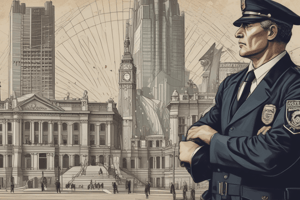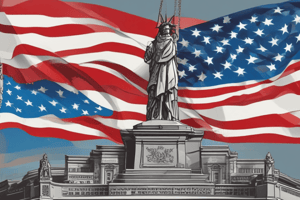Podcast
Questions and Answers
What is the primary focus of public law?
What is the primary focus of public law?
The relationship between the state and its citizens.
Which of the following is NOT a key area within public law?
Which of the following is NOT a key area within public law?
- Criminal Law (correct)
- Human Rights Law
- Administrative Law
- Constitutional Law
Private law deals with relationships between individuals or entities.
Private law deals with relationships between individuals or entities.
True (A)
What is the main purpose of Constitutional Law?
What is the main purpose of Constitutional Law?
The separation of powers is a principle that aims to distribute government authority among different branches, leading to checks and balances.
The separation of powers is a principle that aims to distribute government authority among different branches, leading to checks and balances.
What is the primary purpose of Administrative Law?
What is the primary purpose of Administrative Law?
Administrative law primarily focuses on procedural matters.
Administrative law primarily focuses on procedural matters.
Which of these is NOT a key principle of Administrative Law?
Which of these is NOT a key principle of Administrative Law?
What is the main objective of Human Rights Law?
What is the main objective of Human Rights Law?
Which of these is NOT a key area of Human Rights Law?
Which of these is NOT a key area of Human Rights Law?
Human Rights Law is established solely through domestic legislation.
Human Rights Law is established solely through domestic legislation.
The Universal Declaration of Human Rights plays a crucial role in codifying and promoting human rights globally.
The Universal Declaration of Human Rights plays a crucial role in codifying and promoting human rights globally.
Flashcards
Public Law
Public Law
Governs the state's relationship with citizens, focusing on government powers, rights, and duties.
Constitutional Law
Constitutional Law
Establishes fundamental principles and limits government power.
Separation of Powers
Separation of Powers
Dividing government power among different branches (e.g., legislative, executive, judicial).
Fundamental Rights
Fundamental Rights
Signup and view all the flashcards
Rule of Law
Rule of Law
Signup and view all the flashcards
Administrative Law
Administrative Law
Signup and view all the flashcards
Human Rights Law
Human Rights Law
Signup and view all the flashcards
International Treaties
International Treaties
Signup and view all the flashcards
Domestic Legislation
Domestic Legislation
Signup and view all the flashcards
Right to Life
Right to Life
Signup and view all the flashcards
Freedom of Expression
Freedom of Expression
Signup and view all the flashcards
Equality
Equality
Signup and view all the flashcards
Transparency
Transparency
Signup and view all the flashcards
Accountability
Accountability
Signup and view all the flashcards
Access to Information
Access to Information
Signup and view all the flashcards
Challenging Decisions
Challenging Decisions
Signup and view all the flashcards
Supreme Law
Supreme Law
Signup and view all the flashcards
Private Law
Private Law
Signup and view all the flashcards
Administrative Procedures
Administrative Procedures
Signup and view all the flashcards
Universal Declaration of Human Rights
Universal Declaration of Human Rights
Signup and view all the flashcards
Fundamental Principle
Fundamental Principle
Signup and view all the flashcards
Government Agency
Government Agency
Signup and view all the flashcards
Structure of Government
Structure of Government
Signup and view all the flashcards
Government Power
Government Power
Signup and view all the flashcards
Study Notes
Public Law
- Public law governs the relationship between the state and its citizens. It's concerned with the organization and powers of government, and the rights and duties of citizens in their dealings with the state.
- Key areas within public law include constitutional law, administrative law, and human rights law.
- It differs from private law in that private law deals with relationships between individuals or entities.
Constitutional Law
- Constitutional law deals with the fundamental principles and rules that govern a state.
- It outlines the structure and limits of government power.
- Key elements often include:
- The separation of powers: Distributing governmental authority among different branches, enabling checks and balances.
- Fundamental rights and freedoms: Guaranteeing basic rights and liberties to citizens.
- The rule of law: Ensuring that all laws and actions of government are subject to legal constraints.
- Constitutions function to serve as a supreme law, providing the overarching framework for the legal system.
Administrative Law
- Administrative law deals with the actions and decisions of government agencies.
- It regulates the powers and procedures of administrative bodies.
- Aiming to balance efficiency with accountability, it sets standards for administrative practice.
- Administrative law principles are often procedural in nature, focusing on issues like:
- The right to access information held by government agencies.
- The right to challenge administrative decisions.
- Ensuring fairness and transparency in administrative processes.
Human Rights Law
- Human rights law protects fundamental rights and freedoms that belong to all individuals.
- It's established through international treaties and domestic legislation.
- Key areas often include:
- The right to life, liberty, and security of person.
- Freedom of expression, religion, and assembly.
- Equality and non-discrimination.
- Rights relating to the social and economic spheres (e.g., access to healthcare and education).
- International instruments, such as the Universal Declaration of Human Rights, play a crucial role in codifying and promoting human rights globally.
- The implementation and enforcement of human rights law often necessitate a complex interplay between domestic and international frameworks.
Studying That Suits You
Use AI to generate personalized quizzes and flashcards to suit your learning preferences.




